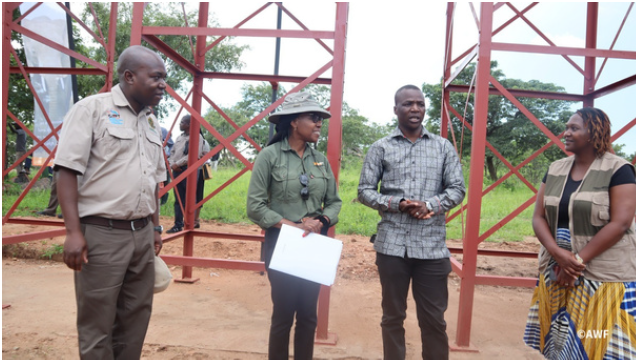Environment, Climate, and Wildlife deputy minister John Paradza, embarked on a three-day visit to the Mid Zambezi Valley communal areas, demonstrating a commitment to address the pressing issue of human-wildlife conflict. The visit, which took place from February 7th to 9th, aimed to gather firsthand information on community concerns and explore potential mitigation measures.
Paradza’s tour included interactions with local communities and stakeholders, focusing on understanding the interventions implemented to mitigate human-wildlife conflict. The African Wildlife Foundation (AWF), in collaboration with Zimbabwe Parks and Wildlife Management Authority (Zimparks), Rural District Councils, and other partners, showcased ongoing initiatives during the Deputy Minister’s visit.
Through funding from the D.N Batten Foundation, AWF facilitated the drilling of a borehole and installation of water reservoir tanks, ensuring access to clean and safe water for over 100 households. Speaking during the visit, Paradza expressed his satisfaction and commended the efforts of AWF and encouraged continued support for similar initiatives across affected regions.
“If we come this side, we can tell people that this is what we are doing with our partners. We are very happy with the project, and we would like you [African Wildlife Foundation] to continue doing the good work, not only this side, look at the whole landscape and people who are affected by conflict with wildlife, they are many,” Paradza said. Local leaders echoed the sentiments of gratitude, highlighting the transformative impact of the water provision project on their daily lives.
“What you did for the community is very important, this is a welcome development, we had no access to a nearby clean water source for a long time; if I had an opportunity, I would have shown you some of the unprotected wells that we used to fetch water from, now we are getting water straight from the taps like the one that you seeing there. So far AWF has installed 7 taps for us,” Friday Innock, Hotel Village headman said.
AWF Zimbabwe Country Director, Olivia Mufute, emphasized the ongoing commitment to community empowerment, outlining plans for the establishment of the Hotel Village Nutrition Garden. “In addition to the nutrition garden, AWF in partnership with Zimparks will also capacitate young people to venture into fish farming, a move that is capable of providing income for their [young people] needs,” Mufute said.
The initiative, which focuses on horticulture and fish farming, aims to provide sustainable livelihood opportunities for youth while enhancing food security within the community. In a separate engagement in Mbire District, Deputy Minister Paradza recognized the vital role of community wildlife scouts in mitigating human-wildlife conflict.
He conferred certificates upon 43 scouts who underwent ranger training, supported by AWF through the Swedish International Development Agency (SIDA) funded ‘UTARIRI – Integrated and Adaptive Biodiversity, Climate and Livelihoods Project in the Zambezi Valley, 2022-2025.’



